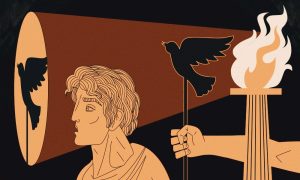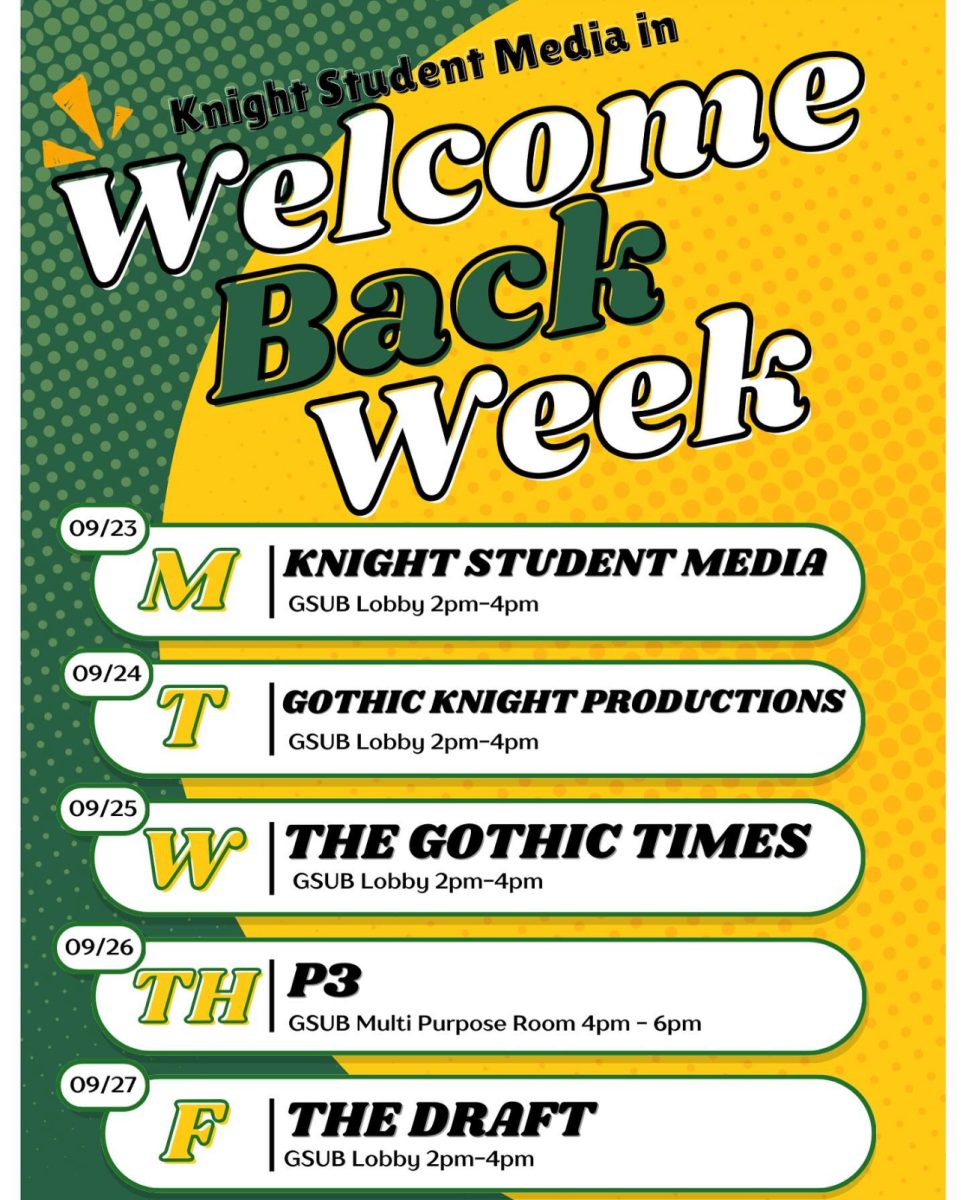In Between the Panels
June 28, 2016
On an ordinary Wednesday in a small town where nothing special happens, I took a walk that was basically routine for me every week. It was the walk that would give me the answers to the questions on my mind. “Must there be a Superman?” “Is Batman eternal?” “Has the Justice League held humanity back from its own potential?” Why would I ask myself these questions? If Sheldon Cooper from the “Big Bang Theory” were here, he’d give you the answer in simplest terms: Wednesday is new comic book day.
As I walked into Vector Comics, a small store that has withstood the tests of time, to pick up my stories for the week, I was given another question to ask as the shopkeeper handed me a small pamphlet as I paid for my purchase. I stared at the pamphlet for at least 30 seconds when I finally asked “what is this?” I couldn’t believe what I had just read: Vector Comics was closing. I almost started to panic. Where was I going to find out what happened to the Man of Steel or the Dark Knight in their next adventures? There wasn’t another comic book store in town. But in the chaos that ensued in my mind for that brief moment, my fear turned to relief. Vectors wasn’t closing, it was changing direction. Vectors had served at the forefront of Bayonne’s comic book community long before I was born. I was told it used to be a camera shop before that. Where it once changed before, it was doing so again. But in its wake, a new store was manifesting itself to serve the needs of many fellow readers such as myself, and Vectors was helping this new entity to do so. One floor above Senerchia’s Meat Market, Manifest Comics swooped in to save the day. Where one store had served the public for countless years, they were now passing the torch for a new generation.
Manifest Comics took what made Vectors great, such as its wide selection of titles to read from and intimate service, and made it its own. Mike Chen, the store’s owner, had an epiphany one day. He wanted to take control of his own destiny. A native from Illinois, Chen wanted to stray away from his current career and focus work on something that would make him happy.
“Before this I was a college professor and I was looking to do something else with my life,” said Chen. “I was a little tired of the structure of higher education I guess and I’ve always liked comics. Some of my frustrations stemmed from kind of not being in control of my own destiny or being my own boss so I looked into whether or not it would be feasible to open up a comic and hobby shop.”
Chen took the chance and pushed the reset button and started over as he ventured out to the Garden State. With Vectors preparing to change course, opportunity presented itself.
“I wanted to be closer to my family since they live in Jersey and I was out living in Illinois,” he said. “I looked around for where it seemed like a town might need a comic shop or where there might be some demand and that was Bayonne. And it just happened to be pretty close to my family too.”
Stores that specialized in the sales of comic books exclusively didn’t begin to appear until the late 1960’s. Prior to this, comic books were only sold at newsstands, drug stores, grocery stores, etc. These new specialty shops would stock back issues as well as new releases with newsstands serving as their source for this material. Once the direct market appeared, the dominant distribution and retail network for American comic books which formed in the 1970’s, a large network of comic book shops were able to successfully flourish. Direct market stores could also cater to older, more mature audiences. This allowed comic stores to sell material that was deemed too offensive to be sold at drug or toy stores. Retailers were also able to begin marketing merchandise such as figurines, posters, and toys which wouldn’t normally be found in other areas of business that sold comic books. The newsstand era was beginning to fade out.
Opening a new business is never something that’s easy. There’s no denying that the chances of opening a business and having it be successful in today’s climate are very slim, especially when big corporations have been dominating the small “Mom & Pop” stores for the past couple of decades. In my hometown, no small business ever lasts. It’s a miracle if even a new business has even survived past a year. But how does a business survive? You need an audience that demands the certain services you can provide. You wouldn’t know this, but in my town, there are people who demand comic books. Even the people you would least expect where into the medium. This gave Manifest an edge that would lead to its success. Chen knew he had to take a chance if he was going to open his comic book shop, and he did so in an area that was in need.
“I had to do a lot of research, but not just into the comic book industry,” said Chen. “I read a lot of blogs and articles about it but also articles about small businesses and tax laws. You know, how to find the right space or how much space I would need. So that took a couple of months. Before I even started on that project I talked to my then girlfriend, she’s now my wife, and my family to kind of go over the pros and cons of everything. Once we had all of these conversations and did a lot research, and came up with a lot of plans I felt like I had a good grasp of things. That’s kind of when I felt “you know what, I think I can do this.””
In order to achieve success, sacrifices have to be made. With those closest to him showing their support, Chen did just that when he put his teaching career aside to achieve a dream that some would have thought to be farfetched.
“Those closest to me supported me,” said Chen in regards to his decision to start a business. “You know there’s always people who are like “oh that was crazy” and they don’t want to say anything but once the business was successful and seemed like it was going to stick around for a while, then certain people were like “wow, you know I wasn’t really sure if this was going to work out or not.” I had a couple of relatively close friends at the time who kind of thought I was pretty crazy. And I understood, I wasn’t hurt by that. I felt it made sense and I appreciated them saying that. So I wouldn’t say that everyone who was close to me was like “this is great,” but I would say that most people were very supportive.”
New Jersey is the most densely populated state in the U.S. Because of this, it has the highest density of shops per square mile in the country and also has a long tradition of comics and collectibles. The 1990’s, comic books saw a peak in popularity and shops were opening up all across the country. This was the highest point of the famous “Speculator Boom.” Before the 1960’s, a very small amount of specialty shops for comics existed, but comic book collecting had already become an organized hobby. Long before the world had been spoiled by the negative den known as the internet, comic book fans could only reach out to each other and the publishers by writing letters in the comic book letter pages found in every monthly issue. The generation of fans in the 60’s would be the first to gather and create the first comic book conventions in the U.S. Through these series of events, comic book speculation had been conceived. While some people collected comic books for personal interest, other collected for a foreseeable profit in the future. The comic book speculation suggested that certain key issues, such as the debut of a major character or even the death of one, would go up in value over time. The Speculator Boom was at its highest peak between 1985 and 1993. While everyone was buying what was hot at the time, they were ignoring what was really going up in value: any comic that was published before and during World War II, which became highly rare after most back stock of any issues were thrown into the trash, making them high in value. Ironically, the comics that were currently being published and said to be “hot” were in fact quite the opposite. Most of them can be found today and are usually sold under a dollar a piece.
The speculator boom was sometimes overstated, but it did not stop the comic book industry from marinating itself in it. Publishers began using numerous marketing tactics, some still used today, to appeal to the collectors market. Some of these tactics included taking certain series and relaunching them new #1 issues, while other issues would be printed with multiple variant cover so completists would buy multiple copies of a single issue. One of the biggest tactics publishers used was massive retooling of certain comic books, or “shake-up” storylines to generate more publicity. The most famous example of this came in 1992 when DC released a story known as “The Death of Superman.” The storyline and the publicity it received caused a massive rise in the speculators boom. People flocked comic book stores all over to get their hands on Superman #75, due to the value it would have in the future for killing off not just one of the biggest comic book characters, but an American icon. However, this gimmick soon alienated comic book fans when the big con was revealed, and by now most people known that Superman didn’t die. Even with the advent of comic book stories such as this one being collected in one volume in trade paperback format, issues like Superman #75 became virtually worthless.
Eventually, the speculators market crashed between 1993 and 1997 and the comic book industry nearly collapsed. The speculators boom was one of the main causes of the crash of ’93. I already stated that early comic books had become valuable due to the fact that not many of them had survived and the idea that future comics might someday be valuable began a spike in the market. However, most local comic shops would over order comics in massive numbers. There was a demand that could not be met by their suppliers. The reason early comics were valuable was because of how rare they were, while the newer comics were being spit out by the millions. Anyone who wanted a copy of Superman #75 or the new X-Men #1 in the hopes of it gaining value in the future could get them anywhere because there were millions of copies of these comics floating around everywhere. There was no value in them. When the comic book stores and the public came to realize this, the industry split open and its insides spilled out like angel hair pasta. The publishers and the stores soon lost money and many went out of business because sales plummeted to an all-time low. Marvel even filed for bankruptcy at the near end of the crash in ’97. But despite going bankrupt, they were still able to publish. Even after all the damage had been done, the publishers that remained standing picked up the pieces and business resumed.
Before and even during the crash in the 90’s, there were always two comic book stores at different points in time in Bayonne. There was a time where there were even more. Before Manifest Comics came to be, there was most famously Vectors. At a certain point before Vectors and even during that time, there was a comic book store known as Earth 1, and its predecessor known as Earth 2 (both a reference to the parallel universes in the DC universe). Bayonne Comics was also another store that stuck around for quite some before closing and leaving Vectors as the last one standing. Each store thrived on the communities that they had each built. Even in the relatively short time that Manifest has been around, the store has built up a sizable community, of course with the occasional walk in traffic here and there.
“With most comic shops I think the direct market has morphed into one where there’s obviously walk-in traffic,” said Chen in regards to regular customers and walk-ins. “There’s people who will just see a movie and then see the store and think “oh, that’s cool, let me pop in.” You know, there are parents who bring their kids in because they want to try anything to get them to read and comic books help with that. But then there’s also the core group of regular customers that come in once a week and those who come in once a month or so and they have their subscription lists and their pull boxes here with what we pull aside from them and order for them every week so that’s definitely a good core group. And when we started a lot of that was carried over from Vectors so that way there would be a continuity of service because when Vectors closed they could have gone online or to another store further away and that’s tough because there are not a lot of stores like this in Hudson County and it’s such an expensive place to have a business.”
Manifest, like most local comic book shops, doesn’t just cater to comic books. Most shops today always feature an area where people can hang out and not just read or talk about their favorite characters or stories, but to even play board games or other table top games. For some people, their comic book shop is really personal. Almost like movies, it’s an escape, but not in a negative sense. A torch has been passed down to Manifest and it has helped keep communities like this alive.
Regarding the hang out space in the store, and the community in general, “There’s a lot of things that I wanted to have that space for and I think that across the board, I’ve seen the store and the community grow consistently every single year,” said Chen in regards to the hang out space in the store and the community in general. “We have more subscribers than we did when we started, we have more people playing games than we started, we have more different gaming events than when we started so there’s definitely been a lot of growth. You know part of the reason I felt good about opening the business, and a lot of people don’t know this, but comics are the only print medium that’s growing. It’s growing each year and in some years even by double digits so that’s something we want to continue. I think a lot of it is because it’s not like reading a newspaper or reading a book because those are great individual pursuits whereas reading a comic book or following a comic book character or collecting comic books or playing any of these games, they make you part of a community and with that community being here is sort of a self-fulfilling prophecy were it’s not just like “if you build it, they will come” because they don’t have to. Because it’s like if you build it and you make it a choice to foster a good community to encourage the right type of people, the friendly people, the encouraging people, the natural teachers of various hobbies, then people will keep coming back.”
Thinking about that fateful day I walked into Vectors and found out they were shifting business, I almost didn’t know what I would do now that the only comic shop in town was, for the lack of a better term, going away. But I’ve been thankful for the quick state of relief when I learned of the new hero in town. It’s great that others in a relatively small and ordinary town can still keep up with their favorite stories and favorite characters.
“I’ve often thought about where the store will be in the future,” said Chen. “But I’m more of a “what’s in front of me” person. Like this year for instance, my big hope was to expand a lot of the graphic novel offerings and have more gaming events so we’re working towards that. Ten years from now I hope the store is in a bigger space. I hope it’s doing well and constantly growing. I would just like to improve it every single year and to never get complacent and never take weeks off to read comics or stop researching what’s coming out and never stop listening to the customers. I just hope to keep growing it and to keep it the best community center that it can really be.”
To be a comic book reader and a member of the comic community, it’s not about being a part of something bigger than one’s self, it’s just about being a part of something, and it’s something wonderful. Twenty to thirty years ago, you were often made fun of for hanging out at a comic book store. We are at point now, in the 21st century, where national events like Comic-Con show just how much the world has embraced the comic book culture. People are now free to express themselves and their love for the medium. Nobody has to be ashamed to admit they like reading comics, to which I had once regretfully admitted in regarding to how I knew of the poem “Ozymandias” by Percy Bysshe Shelley. I learned it from a comic book. But they’re not like some mindless action movie that’s pure popcorn entertainment. In some ways, they’re a reflection of stories told long ago and in other ways, they’re a reflection of things that are happening now.











